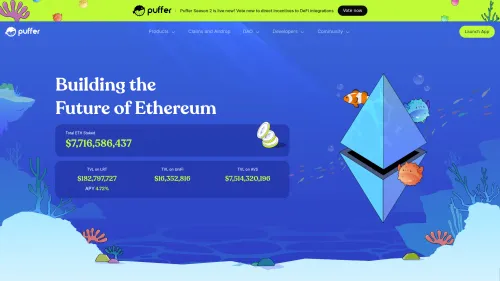Puffer (PUFFER)
Puffer is a decentralized native liquid restaking protocol (nLRP) developed on Eigenlayer. It is designed to streamline native restaking on Eigenlayer, allowing users to run Ethereum Proof of Stake (PoS) validators and potentially enhance their rewards.
Overview
Founded in November 2022 by Amir Forouzani, Puffer aims to improve the security of validator operations while maintaining decentralization. It features Anti-Slashing technologies and a Secure-Signer tool to mitigate slashing risks, alongside a Secure-Aggregator for efficient liquid staking. Developed on Eigenlayer, Puffer enables users to operate Ethereum PoS validators with less than 2 ETH, aiming to increase rewards. The protocol promotes permissionless Node Operator participation to uphold Ethereum's decentralization. Key features include permissionless validator operation, anti-slashing hardware support, and immediate liquidity for rewards. The Mainnet was launched on May 9th, 2024.

| Ticker | PUFFER |
| Category | Smart Contract Platform |
| Website | https://www.puffer.fi/ |
| @puffer_finance | |
| Telegram | puffer_fi |
| Contract Addresses | |
|---|---|
| ethereum | 0x4d...30 Copied! Copied! |
Puffer modules
Puffer Modules are essential components of the protocol, managing EigenPods that function as native restakers. Each module comprises validators governed by Node Operators (NoOps), whose ETH is restaked for Eigenlayer AVSs. Restaking Operators (ReOps), selected by a DAO, carry out AVS tasks in return for fees. The protocol assigns AVSs based on risk preferences, enabling NoOps with less than 2 ETH to participate and earn rewards. Joining a module is permissionless for NoOps, who must lock 1 or 2 ETH as collateral and validator tickets. They retain all PoS rewards from their validator and receive additional restaking rewards.
Validator tickets
Validator Tickets (VTs) are ERC20 tokens that allow holders to operate a staker-funded Ethereum validator for one day. Created through ETH deposits, they compensate pufETH holders. Operators must lock VTs and 1 ETH of pufETH as collateral. The pricing of VTs is based on expected daily earnings. To register, operators must deposit at least 28 VTs and 1 ETH in pufETH, with each VT corresponding to one validator-day. VTs enhance capital efficiency while introducing new trust requirements and initial capital needs.
Rewards
The Puffer protocol generates rewards from validator tickets and restaking, increasing the ETH backing pufETH. Stakers receive PoS and restaking rewards by holding pufETH. Node operators (NoOps) get all PoS rewards and additional earnings from holding pufETH. Restaking operators are compensated with fees for managing AVSs, while guardians receive fees for their services. NoOps are entitled to 100% of consensus rewards, allocated to their EigenPod, and execution rewards that allow them to manage MEV strategies. Restaking rewards come from AVS fees, with some payments in ETH and others in ERC20 tokens.
Guardians
Guardians in the Puffer Protocol are authorized nodes ensuring protocol stability, designed to phase out as Ethereum evolves. They function as a community-based decentralized autonomous organization (DAO) focused on the protocol's success. Their main responsibilities include ejecting validators under certain conditions, vetting NoOp validator registrations, and returning bonds when validators exit. A majority consensus is required for significant actions.
Burst threshold
The Burst Threshold represents Puffer's commitment to capping its validator market share at 22% of Ethereum's total. Rather than stopping staking at this limit, Puffer aims to gradually reduce staker demand. As the threshold is approached, the number of mintable validator tickets will decrease, allowing only existing validators to be supported. This strategy is intended to establish this threshold from the outset.
Products
Secure-signer
Secure-Signer is a remote signing tool designed to prevent slashing offenses using Intel SGX technology, supported by an Ethereum Foundation grant. It utilizes Trusted Execution Environments (TEEs) to protect validator keys, with plans to expand to AMD's SEV. Secure-Signer can operate locally or on remote servers, encrypting validator keys and maintaining a secure database to reduce slashing risks and enhance network resilience. Puffer encourages diverse implementations to strengthen the validator ecosystem.
RAVe
RAVe, or Remote Attestation Verification, is a component of Puffer's Ethereum Foundation grant that facilitates secure interactions between enclaves and blockchains, supporting permissionless functionality. It allows nodes to verify that they are running a specific SGX enclave, ensuring application integrity. RAVe v1 uses EPID-based attestation through Intel's Attestation Service (IAS) to confirm enclave validity. In the Puffer Protocol, RAVe verifies that nodes operate Secure-Signer and registers validator public keys on-chain.
Tokenomics
Puffer token ($pufETH)
pufETH is a reward-bearing ERC20 token designed for compatibility with decentralized finance (DeFi), inspired by Compound's cToken. It offers a dual-source reward system combining Ethereum PoS rewards with earnings from restaking services. The token uses validator tickets to enhance value growth by frontloading PoS rewards, encouraging participation. Unlike traditional liquid staking tokens (LSTs), pufETH decouples rewards from validator performance, ensuring stable returns. It integrates seamlessly within the LSDeFi ecosystem, allowing users to access restaking rewards directly by holding the token.
Funding
Puffer has raised a total of $23.5 million through two funding rounds to support its development within the Ethereum ecosystem. The initial $5.5 million seed round, co-led by Lemniscap and Lightspeed Faction, aims to improve the viability of home stakers and promote decentralization through anti-slashing technology. Puffer secured $18 million in a Series A round led by Brevan Howard Digital and Electric Capital to facilitate the launch of the Puffer Mainnet and reduce the entry threshold for validators. These funding rounds involved various aligned investors and community funds, reflecting a commitment to the objectives of the Puffer protocol and the liquid staking market.
Ambassador program
The Puffer Pioneers Ambassador Program aims to engage community members in supporting Ethereum and the liquid staking token (LST) market. Participants may receive rewards and financial incentives, along with the "Puffer Pioneer" role and an NFT. They also gain early access to updates and training opportunities. The program seeks individuals who are passionate about cryptocurrency and knowledgeable in DeFi and LSTs. Roles include content creation, community building, or business development. Applications are open for a designated period through a form.
